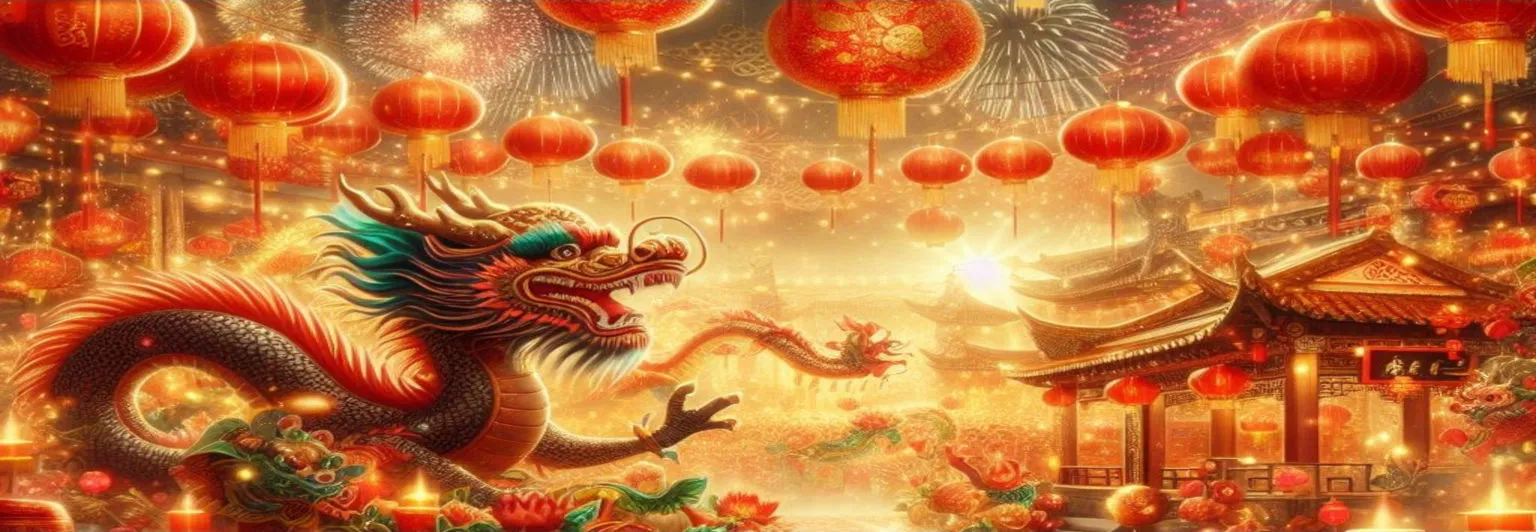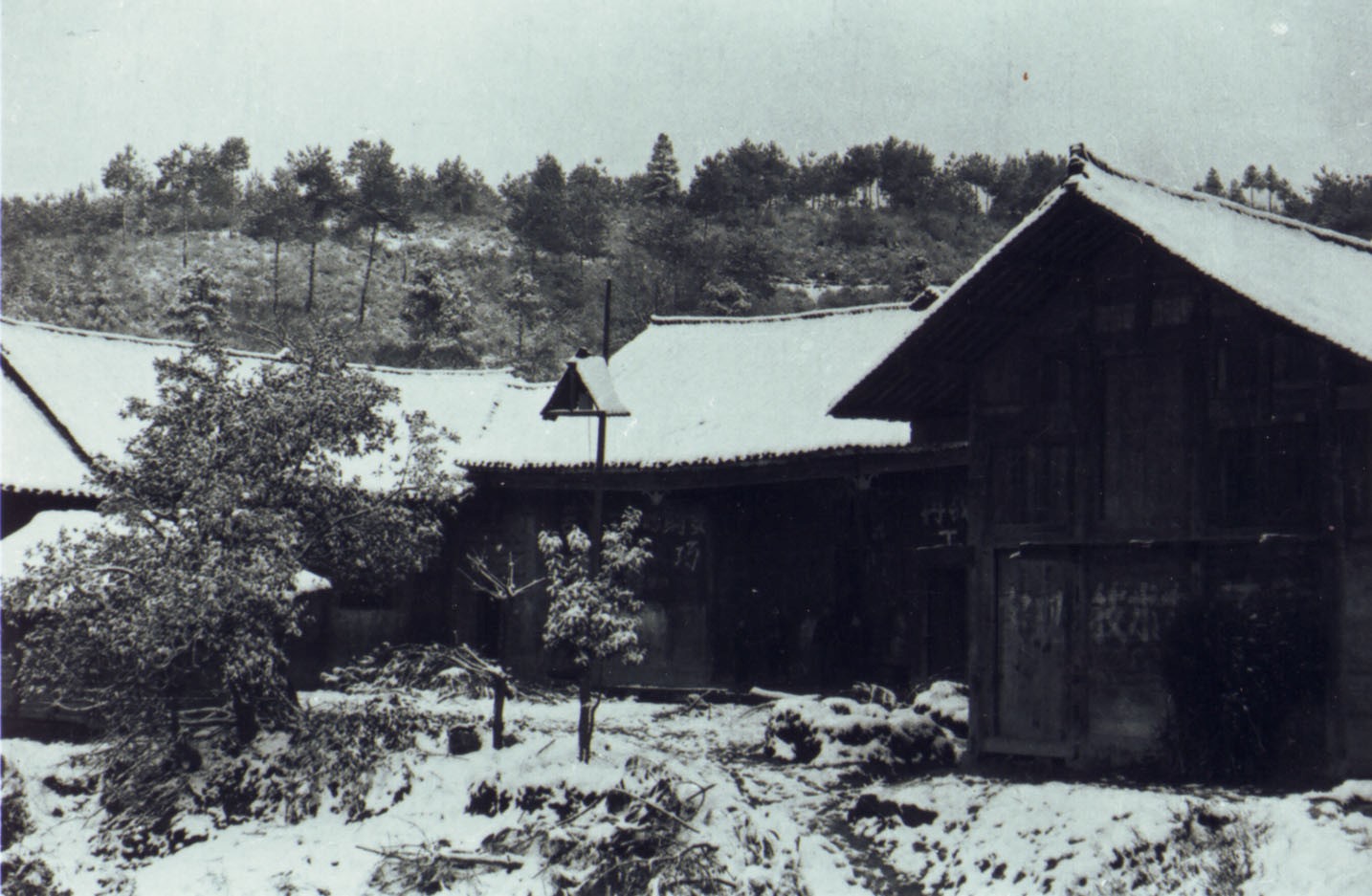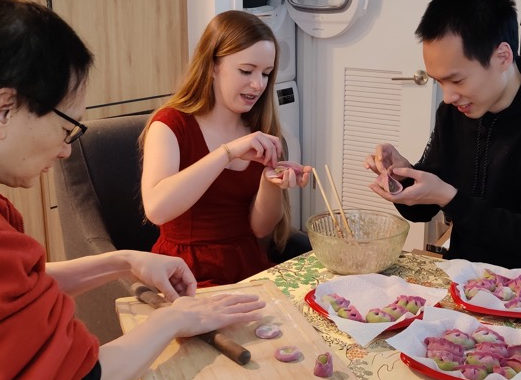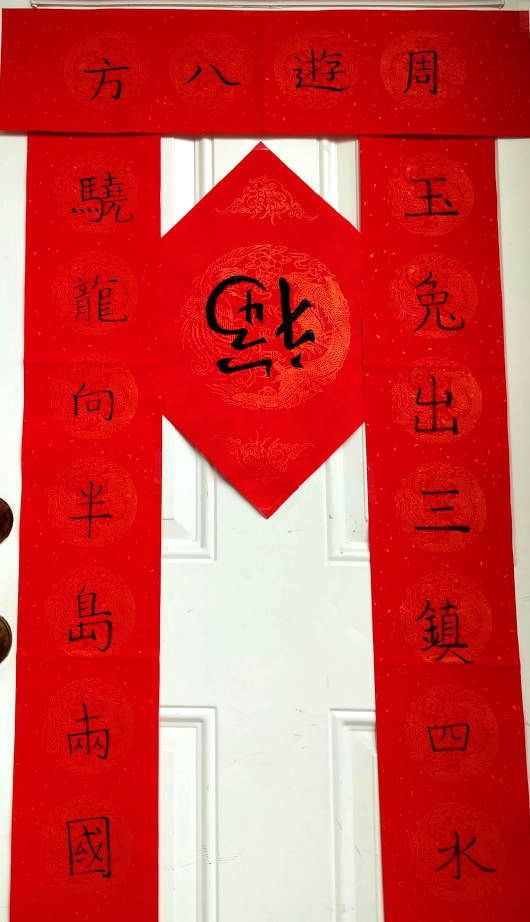

Jackson He
I grew up in China, where the celebration of the Lunar New Year is a big deal—known as the Spring Festival, it is the most important holiday in the year. Now living in the U.S., my family and I try to honor our Chinese heritage by observing some of the Spring Festival traditions. The way the Lunar New Year is celebrated changed greatly during my life, partly because of my moving to the U.S., partly because the times have changed. In the following, I'll retrace the places I have lived, and illustrate how the celebrations of the Lunar New Year have evolved.
Although I hate to admit it, as it dates me ancient compared to how I feel, I grew up during the so-called Cultural Revolution, a time-period when China went through tremendous social and cultural upheaval. From a young person’s perspective, it’s firstly a time of unmet basic needs and wants, including in food and clothing. And food and clothing are two key aspects of life especially associated with the Lunar New Year. Traditionally, people held feasts, and bought new clothes for the occasion.

In a remote village in Hunan, where I passed two Lunar New Years, meat was scarce. My grandparents, like many villagers, raised a pig each year, to be killed in the days leading up to the Lunar New Year. Nowadays in the same village, a young pig my cousin raised grew to over 100 jin (50 kg, or ~110 lbs.) in less than a month, but in those days 100 jin was the weight of the pig one hoped, or wished, for at the end of the (lunar) year. The pig, like people, also had insufficient calories to eat.
Killing the pig was a noisy and festive affair. It happened in the courtyard in front of the house. A couple of benches having been set up in parallel, the pig was held fast on them by a couple of strong men. The pig squeaked like there was no tomorrow, and as it were, it would not live to see the morrow. With a bucket placed strategically under the pig to catch the blood, a skilled man thrusted a long knife under its neck towards its heart, and the pig’s struggles ended quickly.
All parts of the pig were retained and consumed, as long as they are marginally edible. The blood was made into “blood-tofu”, either with or without actual tofu being mixed in. Fatty tissues were cubed and heated in a pan to produce lard, and the leftover material after lard production was also consumed, either directly or as a part of some dishes. Guts were dried or smoked for consumption later in the year.
It was imperative to keep up the appearances of abundance. Not for the government, which was too far removed from the village life, other than the local level leaders who were themselves farmers as well. It was for a higher authority.
As it turned out, the villagers believed that around this time of the year, the Jade Emperor in the heaven would send down the Kitchen God (a heavenly “king”) as his representative, to spy for him. And if the Kitchen God didn’t see that the people had plenty to eat, or he didn’t get bribed with sufficient amount of tributes to him, he might tell Jade Emperor that the villagers were not working hard enough, and the Jade Emperor might not provide favorable weather for the area in the coming year.
Other than the Kitchen God, everyone’s ancestors were also worshipped and memorialized during this period. Both of these activities were kept secret, because they were not in keeping with the revolutionary ideals. In reality, I didn’t know firsthand if all villagers performed them, but I did see my grandfather do them, quietly. When I went back recently, the temple for the local guardian god was restored and in use, and ancestral worship was practiced in the open.
As I mentioned earlier, Lunar New Year is also a time of procuring new clothes, for children at least if not for everybody. But in those days, this was not done. The villagers were too poor to observe that tradition.
Lunar New Year usually falls in late January or early February, a time where not much could be done as far as farming is concerned. But a couple of weeks later, while it’s still freezing cold out, farmers would start to plow the field in preparation for spring planting.
In Beijing, it being the capital, the situation was much better, despite the fact that food was also generally scarce. Almost all food items were rationed—the rations are the upper limit of things one could buy, but they still had to be paid for. Each family might get some amount of chicken, fish, soy products, sesame oil, etc., to make a good holiday. Only those people with official Beijing hukou (residency registration papers) are provided with these rations.

Lunar New Year is a time for family, extended family if available. In our case, we went to my Gramma’s house. The different members of the extended family lived in different parts of the city, and consequently were likely able to get different food stuff—even rationed food was not sufficient for everybody, so one neighborhood might have gotten a supply of chicken, while another might have fish. With the items pooled together, we were always able to have a feast. The round tabletop was mounted on the square table, and the family sat together for the meal. Northerners such as those from the Beijing area traditionally celebrated Lunar New Year with dumplings, but our family mostly came from the south, and delighted in a plethora of dishes to go with rice.
With the extended family being on the large side, too large for everybody to sit at the large round table, we kids ate at a small table, where space for dishes was more limited, but table etiquette was also very much relaxed. One year, I, under the age of majority, no doubt, had a bit of wine. But it was a bit too much for me. There was no law against it—drinking age was not a thing yet. I had to take a nap afterwards, waking up with a bad case of hangover, and made myself an oath to never drink again. Which I had to break. Many times. But only a little.
In addition to food, yardages of cloth were made available as well, per family according to its size, so clothes could be made. For those families not into making their own clothes, the cloth coupons could be used to buy ready-made clothes, at a higher cost. I had a gifted mom, and she possessed a sewing machine. So that’s where most of my clothes came from. I had no sense of style, and only asked for each kind of clothes be made in a pair, so that when one is being laundered or being hung up to dry, I had another to wear.
In Beijing nobody believed in Kitchen Gods, or any other deities one needed to please at this time of year. So, all the pleasures were one’s own to enjoy.
Traditionally, firecrackers were used to ward off evil spirits. But in real life, who has ever seen evil spirit, other than in people? It’s the fun that firecrackers brought that people were after. At that time, it was still acceptable to set off real firecrackers in Beijing, not the lame sounds of firecracker from speakers as these days. Boys delighted in the activity. I am not sure about girls because at that age, and time, it was considered shameful to talk to them. There was a proper way to set the firecrackers off. Not by lighting the fuse line and setting off a whole chain of them at once, as instructed on the firecracker package. That would be obnoxiously extravagant, and extraordinarily foolish. Instead, the braided firecrackers were carefully separated into singles, and pocketed. Then, with a lit incense in hand, which burned slowly into the night, the boys wandered the quadrangle courtyards and alleyways, lighting the fuse of one firecracker at a time, and tossing the firecracker off when there was only half a second or less to spare. BANG! The firecracker would explode in mid-air, giving out a crispy crack that was sharper and happier than the symphony of background noises, consisting entirely of the explosions of other firecrackers, some nearby, some a few alleys off.
Occasionally a firecracker might explode before it was tossed off. You had known to not letting it get close to your eyes, of course. And you held it by its butt, of course. So it only hurt a little, and blackened your fingers a little. It’s not a big deal, and you certainly would never tell your parents about it. You sucked your fingers, the aroma of burnt black powder rushing up your nostrils. What a sweet smell! Life was good!
I’ve lived in the US longer than in China, and life more or less hums according to the rhythm of the US culture. But I do want to keep some of my Chinese heritage. And one of ways to do that is the celebration of the Lunar New Year.

One year, I celebrated the Spring Festival with a couple of colleagues of Symbol (which eventually, in a roundabout way, became a part of Zebra). Toan was from Vietnam, and Eugene was from Trinidad and Tobago. While at that time Toan was not married, Eugene and I were, but our wives were not around, and we spent the time together. We made dumplings, which was a novel experience for Toan and Eugene. We had to improvise on the ingredients and the kitchen utensils, but the result was remarkably good. Making dumplings, as I explained earlier, was not a tradition of my family, but it is one that many families in China practices, and it allows everyone, family or friends, well-practiced or newbie, to participate, and it is a lot of fun.
In the last few years, my daughter, having learned to do Chinese calligraphy using a brush pen, have been asking me to come up with couplets for her to write and hang up on her door. According to tradition, a couplet is two sentences or phrases that are neatly created to match each other in sentence structure, mirror each other in meter, and complement each other in meaning. A short phrase is also written to give a title or summary to the phrase, and then the whole set is hung up on the door. The characters used are often the traditional ones, instead of the simplified version that she learned to read and write from childhood. For the New Year’s couplets, the content is generally about the prospect for the new year, and the retrospect of the old year. When I was growing up, the tradition of writing and hanging up New Year’s couplets was mostly abandoned in China, but now it is practiced again.
So, times have changed, and now we celebrate the Lunar New Year differently than when I was growing up. In New York State, where I live, the Lunar New Year has become a public school holiday, starting from this year, the Lunar New Year of 2024.
The Lunar New Year is a time of celebration. It traditionally celebrated the harvest of a year’s hard work, and the prospect of a prosperous new year. It now celebrates family, friendships, and traditions.
For 2024, the lunar new year is on February 10.[Originally written for the A2Z (Asians & Allies in Zebra) newsletter. Title image generated using Bing Image Creator.]